英语动词ing的用法
- 格式:doc
- 大小:37.50 KB
- 文档页数:10
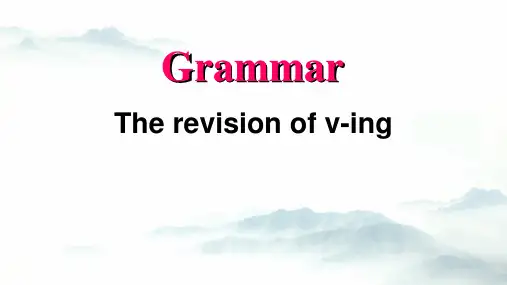
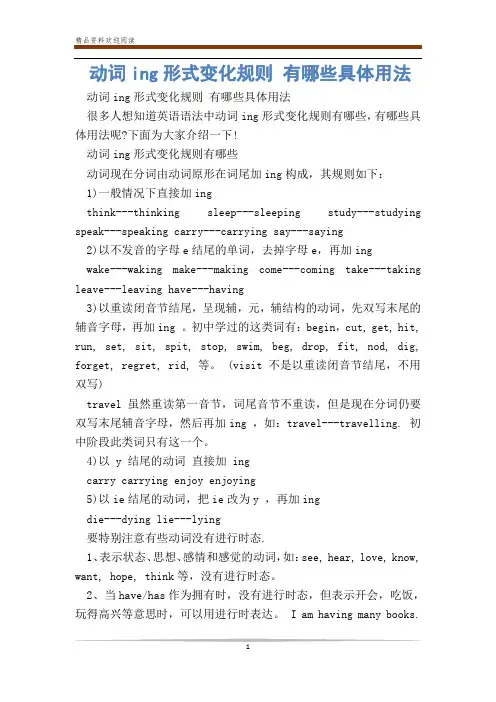
动词ing形式变化规则有哪些具体用法动词ing形式变化规则有哪些具体用法很多人想知道英语语法中动词ing形式变化规则有哪些,有哪些具体用法呢?下面为大家介绍一下!动词ing形式变化规则有哪些动词现在分词由动词原形在词尾加ing构成,其规则如下:1)一般情况下直接加ingthink---thinking sleep---sleeping study---studying speak---speaking carry---carrying say---saying2)以不发音的字母e结尾的单词,去掉字母e,再加ingwake---waking make---making come---coming take---taking leave---leaving have---having3)以重读闭音节结尾,呈现辅,元,辅结构的动词,先双写末尾的辅音字母,再加ing 。
初中学过的这类词有:begin,cut, get, hit, run, set, sit, spit, stop, swim, beg, drop, fit, nod, dig, forget, regret, rid, 等。
(visit 不是以重读闭音节结尾,不用双写)travel虽然重读第一音节,词尾音节不重读,但是现在分词仍要双写末尾辅音字母,然后再加ing ,如:travel---travelling. 初中阶段此类词只有这一个。
4)以 y 结尾的动词直接加 ingcarry carrying enjoy enjoying5)以ie结尾的动词,把ie改为y ,再加ingdie---dying lie---lying要特别注意有些动词没有进行时态.1、表示状态、思想、感情和感觉的动词,如:see, hear, love, know, want, hope, think等,没有进行时态。
2、当have/has作为拥有时,没有进行时态,但表示开会,吃饭,玩得高兴等意思时,可以用进行时表达。
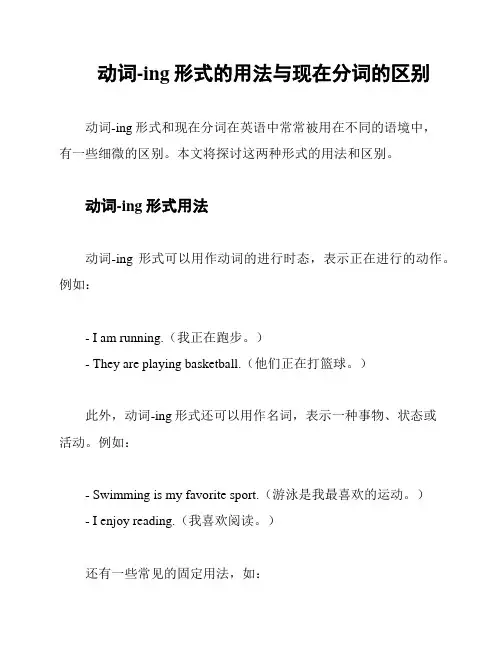
动词-ing形式的用法与现在分词的区别动词-ing形式和现在分词在英语中常常被用在不同的语境中,有一些细微的区别。
本文将探讨这两种形式的用法和区别。
动词-ing形式用法动词-ing形式可以用作动词的进行时态,表示正在进行的动作。
例如:- I am running.(我正在跑步。
)- They are playing basketball.(他们正在打篮球。
)此外,动词-ing形式还可以用作名词,表示一种事物、状态或活动。
例如:- Swimming is my favorite sport.(游泳是我最喜欢的运动。
)- I enjoy reading.(我喜欢阅读。
)还有一些常见的固定用法,如:- It's no use crying over spilled milk.(覆水难收。
)- I'm looking forward to seeing you.(期待见到你。
)需要注意的是,动词-ing形式在这些用法中通常不具有进行时态的含义,而是表示一种状态或情况。
现在分词用法现在分词通常与be动词连用,构成进行时态的被动语态。
例如:- The book is being read by many students.(这本书正被很多学生阅读。
)- The song is being sung by the choir.(这首歌正在被合唱团演唱。
)现在分词还可以用作形容词,修饰名词。
例如:- A thrilling movie(一个令人兴奋的电影)- The interesting book(有趣的书)与动词-ing形式不同的是,现在分词在这些用法中通常具有进行时态的含义。
结论动词-ing形式和现在分词在用法上略有不同。
动词-ing形式常用于动作的进行时态和名词形式,而现在分词常用于进行时态的被动语态和形容词形式。
在使用时,需要根据上下文和语境来决定使用哪种形式。
希望本文对您理解和使用这两种形式有所帮助。

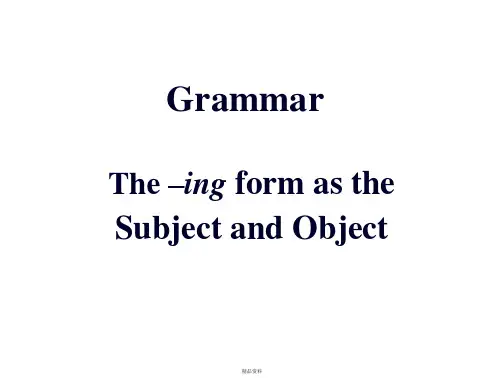
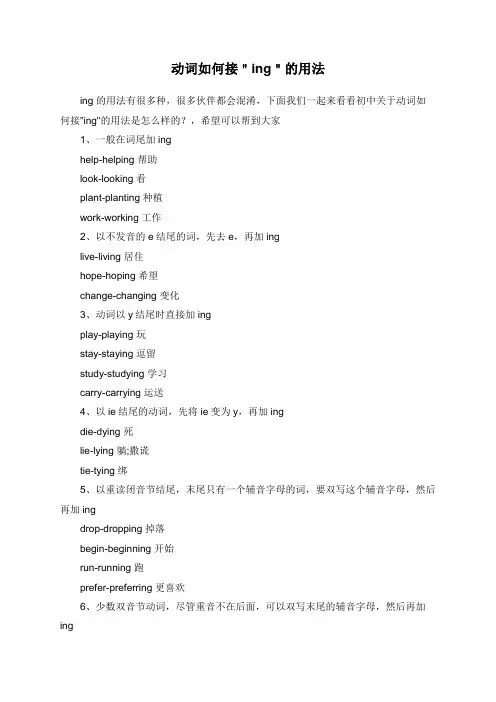
动词如何接"ing"的用法
ing 的用法有很多种,很多伙伴都会混淆,下面我们一起来看看初中关于动词如何接"ing"的用法是怎么样的?,希望可以帮到大家
1、一般在词尾加ing
help-helping 帮助
look-looking 看
plant-planting 种植
work-working 工作
2、以不发音的e结尾的词,先去e,再加ing
live-living 居住
hope-hoping 希望
change-changing 变化
3、动词以y结尾时直接加ing
play-playing 玩
stay-staying 逗留
study-studying 学习
carry-carrying 运送
4、以ie结尾的动词,先将ie变为y,再加ing
die-dying 死
lie-lying 躺;撒谎
tie-tying 绑
5、以重读闭音节结尾,末尾只有一个辅音字母的词,要双写这个辅音字母,然后再加ing
drop-dropping 掉落
begin-beginning 开始
run-running 跑
prefer-preferring 更喜欢
6、少数双音节动词,尽管重音不在后面,可以双写末尾的辅音字母,然后再加ing
travel-traveling (美语)旅行travel-travelling(英语)旅行。
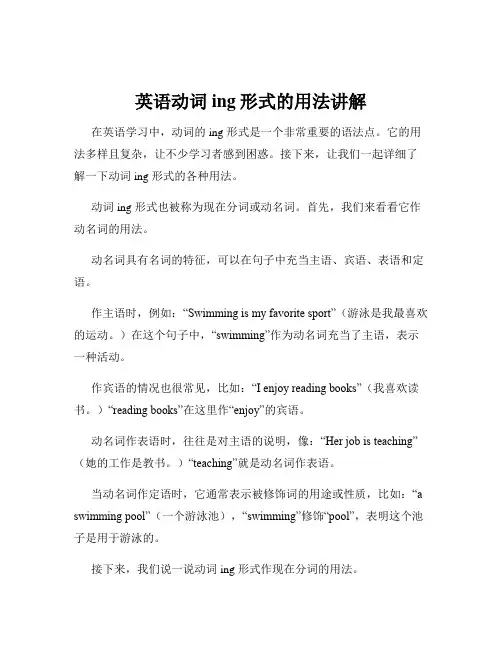
英语动词ing形式的用法讲解在英语学习中,动词的 ing 形式是一个非常重要的语法点。
它的用法多样且复杂,让不少学习者感到困惑。
接下来,让我们一起详细了解一下动词 ing 形式的各种用法。
动词 ing 形式也被称为现在分词或动名词。
首先,我们来看看它作动名词的用法。
动名词具有名词的特征,可以在句子中充当主语、宾语、表语和定语。
作主语时,例如:“Swimming is my favorite sport”(游泳是我最喜欢的运动。
)在这个句子中,“swimming”作为动名词充当了主语,表示一种活动。
作宾语的情况也很常见,比如:“I enjoy reading books”(我喜欢读书。
)“reading books”在这里作“enjoy”的宾语。
动名词作表语时,往往是对主语的说明,像:“Her job is teaching”(她的工作是教书。
)“teaching”就是动名词作表语。
当动名词作定语时,它通常表示被修饰词的用途或性质,比如:“a swimming pool”(一个游泳池),“swimming”修饰“pool”,表明这个池子是用于游泳的。
接下来,我们说一说动词 ing 形式作现在分词的用法。
现在分词在句中主要充当定语、状语和宾语补足语。
作定语时,它通常放在被修饰词之前或之后。
放在被修饰词之前时,多表示正在进行的动作,例如:“The flying kite is very beautiful”(正在飞的风筝很漂亮。
)放在被修饰词之后时,相当于一个定语从句,像:“The girl standing there is my sister”(站在那里的女孩是我妹妹。
)这句话就相当于“The girl who is standing there is my sister”现在分词作状语,可以表示时间、原因、条件、结果、方式、伴随等。
比如:“Seeing the teacher, the students stood up”(看到老师,学生们站了起来。
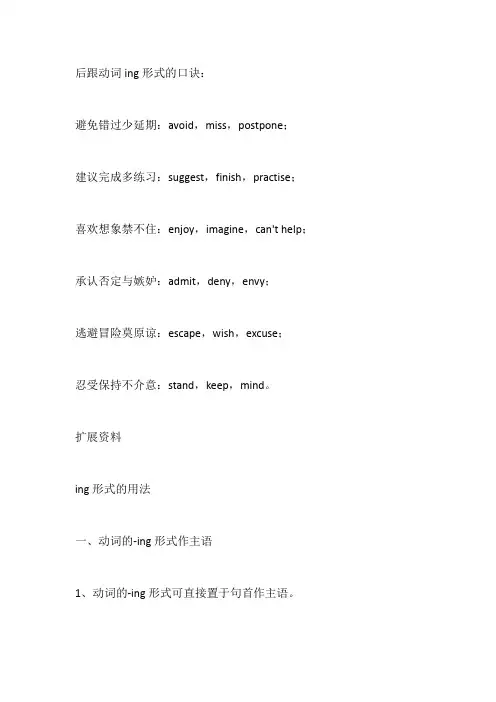
后跟动词ing形式的口诀:
避免错过少延期:avoid,miss,postpone;
建议完成多练习:suggest,finish,practise;喜欢想象禁不住:enjoy,imagine,can't help;承认否定与嫉妒:admit,deny,envy;
逃避冒险莫原谅:escape,wish,excuse;
忍受保持不介意:stand,keep,mind。
扩展资料
ing形式的用法
一、动词的-ing形式作主语
1、动词的-ing形式可直接置于句首作主语。
Seeing is believing.
百闻不如一见。
2、为了保持句子平衡,通常用先行词it作形式主语,而把真正的主语放在句末。
It is easy making plans, but it is difficult carrying them.
制定计划很容易,实行它却很难。
二、动词的-ing形式作表语
动词的-ing形式作表语的有两种不同的含义:
1、表示主语的内容是什么。
2、表示主语具有的特征。
三、动词的-ing形式作宾语
动词的-ing形式既可作及物动词的宾语,也可作介词的宾语。
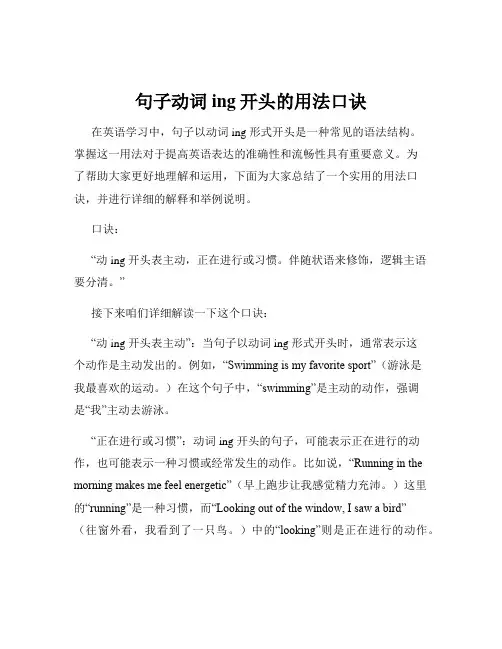
句子动词ing开头的用法口诀在英语学习中,句子以动词 ing 形式开头是一种常见的语法结构。
掌握这一用法对于提高英语表达的准确性和流畅性具有重要意义。
为了帮助大家更好地理解和运用,下面为大家总结了一个实用的用法口诀,并进行详细的解释和举例说明。
口诀:“动 ing 开头表主动,正在进行或习惯。
伴随状语来修饰,逻辑主语要分清。
”接下来咱们详细解读一下这个口诀:“动 ing 开头表主动”:当句子以动词 ing 形式开头时,通常表示这个动作是主动发出的。
例如,“Swimming is my favorite sport”(游泳是我最喜欢的运动。
)在这个句子中,“swimming”是主动的动作,强调是“我”主动去游泳。
“正在进行或习惯”:动词 ing 开头的句子,可能表示正在进行的动作,也可能表示一种习惯或经常发生的动作。
比如说,“Running in the morning makes me feel energetic”(早上跑步让我感觉精力充沛。
)这里的“running”是一种习惯,而“Looking out of the window, I saw a bird”(往窗外看,我看到了一只鸟。
)中的“looking”则是正在进行的动作。
“伴随状语来修饰”:以动词 ing 形式开头的短语还经常用作伴随状语,用来描述主句动作发生时同时进行的另一个动作或状态。
举个例子,“She sat on the chair, reading a book”(她坐在椅子上,读着一本书。
)“reading a book”就是伴随“sat on the chair”这个动作发生的。
“逻辑主语要分清”:这是很关键的一点。
在以动词 ing 形式开头的句子中,要注意其逻辑主语与主句主语的一致性。
比如,“His co ming late made the teacher angry”(他来晚了让老师生气了。
)“coming late”的逻辑主语是“he”,与主句主语“the teacher”不同,所以这里使用了独立主格结构。
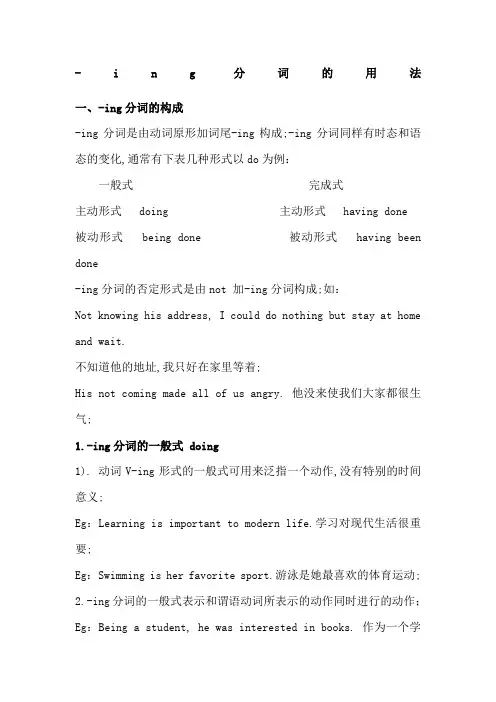
-i n g分词的用法一、-ing分词的构成-ing分词是由动词原形加词尾-ing构成;-ing分词同样有时态和语态的变化,通常有下表几种形式以do为例:一般式完成式主动形式 doing 主动形式 having done被动形式 being done 被动形式 having been done-ing分词的否定形式是由not 加-ing分词构成;如:Not knowing his address, I could do nothing but stay at home and wait.不知道他的地址,我只好在家里等着;His not coming made all of us angry. 他没来使我们大家都很生气;1.-ing分词的一般式 doing1). 动词V-ing形式的一般式可用来泛指一个动作,没有特别的时间意义;Eg:Learning is important to modern life.学习对现代生活很重要;Eg:Swimming is her favorite sport.游泳是她最喜欢的体育运动;2.-ing分词的一般式表示和谓语动词所表示的动作同时进行的动作;Eg:Being a student, he was interested in books. 作为一个学生,他对书本很感兴趣;Eg:They went out of the classroom, talking and laughing. 他们有说有笑地走出教室;2.-ing分词完成式 having done:完成式表示动作在谓语动词所表示的动作之前发生的动作;Eg:Not having studied his lessons very hard, he failed the examinations. 因为没有努力学习功课,他考试不及格;Eg:Having answered the letter, she went on to read an English novel.Eg:Having lived in this city for three years, she knows it very well.3. -ing分词的被动式 being done :-ing分词的被动式表示它的逻辑主语是-ing分词动作的承受者;被动语态-ing一般式所表示的动作是一个正在进行中的被动动作. Eg:The question being discussed is very important. 正在被讨论的问题很重要;4. having done的被动形式having been done表示它的逻辑主语是动词-ing形式表示的动作的承受者;表示动作在谓语表示的动作之前发生;Eg:Having been criticized by the teacher, he gave up smoking. 被老师批评以后,他把烟戒了;Eg:Having been shown the lab, we were taken to see the schoollibrary.在被带去看了实验室之后,我们又被带去参观校图书馆;5动词-ing形式的否定形式;动词-ing形式的否定形式通常是在其前加not,带有逻辑主语时not 应放在动词-ing形式之前;Eg:Excuse me for my not coming on time.Eg:I’m sorry for not having kept my promise.例1. ______ to the station on time made everyone wor ried last week.A. Him not gettingB. Not his gettingC. His not gettingD. Not getting6.动词-ing形式的复合结构动词ing形式的复合结构由形容词性物主代词或人称代词宾格,名词所有格或普通格加动名词,动名词的复合结构实际上是给动名词加了一个逻辑主语; 动词-ing形式的复合结构有四种形式:①形容词性物主代词+动名词②名词‘s +动名词③代词宾格+动名词④名词+动名词注意动名词的复合结构可在句中作主语或宾语;作主语时,不能用③④两种形式;Eg:Tom’s winning the first prize last year impressed me a lot. 汤姆去年得了一等奖使我印象深刻;Eg:Do you mind my/me/Jack’s/Jack leaving now.翻译练习:His coming made us very happy. 他的到来使我们大家都很高;翻译练习:He was awakened by someone’s knocking at the door. 他被某人的敲门声吵醒了;二 -ing分词的语法作用动词-ing一方面具有动词的性质,另一方面也相当于一个名词或形容词、副词,在句中可以作主语、表语、宾语、定语、状语和补语等; 1–ing分词短语作主语: 动词ing形式作主语往往表示经常性、习惯性的动作,谓语动词用单数:Eg:Reading books widens our knowledge.读书增长我们的知识Eg:Saying is easier than doing. 说比做容易;翻译练习:Learning English well is not easy.在下面两种结构中,-ing分词也作主语;A.It is no use/no good/useless/worthwhile/dangerous/a wa ste of time /fun等后需用动名词作真正的主语;为了保持句子平衡,通常用it 作形式主语,而把真实主语放在句末;Eg:It is no use crying over spilt milk. 覆水难收Eg:It's a waste of time arguing about it. 辩论这事是浪费时间;翻译练习:It is no use waiting for him any longer.B.当句型“There is no doing…”表示“不允许、禁止某种行为的发生或存在”时,需用动名词作主语;Eg:There is no joking about such matters. 这种事开不得玩笑;There is no point indoing sth 干…….没意义; Eg:There’s no point in waiting. 等待是毫无意义的; There is no senseindoing sth. 干…没道理/意义例.1.In my mind,_____ that famous university will be the only way to become a worlds-class writer. A. attending B.to attend C. attendD. having attended2. My grandfather is a millionaire, but _____ money does not solve all his problem.A. hasB. to haveC. havingD. having had2 -ing分词短语作表语:Eg:His hobby is collecting stamps. 他的爱好是收集邮票; Eg:The problem is quite puzzling. 这个问题很令人困惑;3 -ing分词作宾语:①–ing分词可作动词宾语, 作动词的宾语;mind介意, suggest建议, enjoy欣赏,, admit承认, appreciate 感激,欣赏, avoid避免, delay推迟, dislike不喜欢,厌恶, escape 逃脱, finish完成, forgive宽恕, imagine想象, keep保持, miss 错过, practise训练, resist抵抗,抵制, risk冒险, deny拒绝,否认, consider考虑等;Eg:I suggest doing it in a different way. 我建议用另一种方法做这件事;Eg:We enjoy attending Miss Li''s class. 我们喜欢听李老师的课;例1:He got well-prepared for the job interview, for he couldn’t risk _____ the good opportunity.A. to loseB. losingC. to be lostD. being lost答案B.后risk 后接动名词,he与 lose是主谓关系;2:Bill suggested _____ a meeting on what to do for the Shanghai Expo during the vacation.A. having heldB. to holdC. holdingD. hold3.To improve your spoken English, you should practic e_____ it every day. A. speak B. to be spo ken C. speaking D. to speak②-ing分词作宾补,也可用在复合宾语中作真正的宾语,而用it作形式宾语;如:Eg:I don’t think it possible living in such a cold place. 我认为住在这么寒冷的地方是不可能的;Eg:Do you consider it any good trying again 你觉得再试一次会有好处吗③-ing分词作介词宾语,经常用在一些短语的后面;如:Eg:I'm against inviting him to dinner. 我反对邀请他来吃饭; Eg:They don’t feel like walking that much. 他们不喜欢走那么多路;翻译练习:Don’t be afraid of speaking English.不要害怕说英语;此类短语还有很多;如:can’t help忍不住be proud of以……自豪, be responsible for对……负责, insist on坚持, keep on 继续think of考虑,想到, dream of梦想, hear of听说, prevent…from防止,阻止, keep…from防止,阻止, stop…from防止,阻止, be engaged in从事于, depend on依靠,依赖, thank…for因……而道谢, excuse…for因……而道歉, aim at目的在于, set about着手做, be fond of喜欢, be afraid of害怕, be tired of对……厌烦, succeed in成功地做……, be interested in对……感兴趣, be ashamed of对……感到羞愧, put off推迟, give up放弃, be worth值得做……, be busy in doing sth 忙于做某事 ,等等;注意:在有些句子中,介词常可省去;如:Eg:I have no difficulty in communicating with foreigners. 我在和外国人交谈方面没有什么困难;Eg:What can prevent us from getting married 有什么能阻止我们结婚翻译练习: Farmers were busy in getting in the crops. 农民在忙着收庄稼;翻译练习: I have never dreamed of visiting that place. 我从未梦想过要参观那个地方翻译练习: He used to spend a lot of time in playing games. 过去他常花很多时间玩游戏;例1.The girl said that she had never dream of _____a volunteer.A. beB. to beC. beingD. is2. I had great difficulty _____ the suitable food on the menu in that restaurant.A. findB. foundC. to findD. finding3. Seeing the funny scene, I can’t help______.A. laughB. to laughC. laughingD. laughed另外,-ing分词可以和一些介词如in, on, after, against, before, by, for, without, besides等构成短语,在句中作状语;如:Eg:He left ahead of time without saying a word. 他一句话也没说就提前离开了;Eg:Besides cooking and sewing, she had to take care of four children.除了做饭和缝纫以外,她还要照顾四个孩子;Eg:On hearing the news, all the pupils jumped with joy. 一听到这个消息后,所有的学生都高兴得跳了起来;4 -ing分词作定语:①单个的分词作定语一般放在被修饰词的前面,–ing分词作定语可用来说明被修饰的名词的用途和性能;如:reading material 阅读材料 walking stick 手杖 fishing pole 鱼杆flying suit 飞行服 writing table 写字台 listening practice 听力训练reading room 阅览室 swimming pool 游泳池 dining car 餐车sleeping car 卧车 singing competition 歌咏比赛 waiting room 候车室②-ing分词作定语还可以表示所修饰的人或物的动作或状态,在意思上接近一个定语从句,可以表示正在进行的动作,也可表示经常性动作或当时的状态;如:developing countries = countries that are developing 发展中国家a growing city = a city that is growing 发展着的城市Eg:Who is the student standing by the door 站在门边的同学是谁Eg:They lived in a house facing south.=They lived in a house which faces south. 他们住在一所朝南的房子里;翻译练习:坐在我旁边的女孩是我妹妹;The girl sitting beside me is my sister.翻译练习:有人在敲门There is someone knocking at the door.③–ing分词还可以作非限制性定语,相当于一个非限制性定语从句,常用逗号和句子其它部分分开;如:Eg:When she appeared, John, wearing a dirty and worn-out overcoat, ran to her with joy. 当她出现的时候,约翰穿着一件又脏又破的大衣高兴地跑了过去;5 -ing分词做状语:动词-ing形式作状语可以修饰谓语动词或整个句子,可以表示时间、原因、结果、条件、让步、方式或伴随情况等;①.表示时间:-ing分词短语作时间状语,相当于一个时间状语从句,有时可由连词when, while引出;Eg:Turning around, she saw a car driving up.=When she turned around, she saw a car driving up. 她转过身,看见一辆车朝她开来;Eg:While reading the book, he nodded from time to time. 他一边看书,一边不时地点头;翻译练习:看到那些画,他想起了她的童年;Seeing those pictures, she remembered her childhood.翻译练习: 听到这消息时我们高兴地跳了起来;Hearing the news, we jumped with joy.②表示原因:-ing分词短语作原因状语,相当于一个原因状语从句;Eg:Being tired, he could not walk any further.=As he wastired, he could not walk any further. 因为疲倦,他不能再往前走了;Eg:Not knowing his address, I can’t send this book to him. 因为不知道他的地址,我不能把这本书送给他;Eg:Many of us, being so excited, couldn’t go to sleep that night. 因为非常激动,那晚我们许多人都没睡着;翻译练习:因为不知道路,他无法到那里去;Not knowing the way, he could’t go there.翻译练习:因为激动他睡不着;Being excited , she couldn’t go to sleep.③表示结果:–ing分词短语作结果状语;表示一种必然的结果,可扩展为一个含有并列谓语的简单句;The fire lasted nearly a month, leaving nothing v aluable.=The fire lasted nearly a month, and left nothing valuable. 大火持续了近一个月,几乎没剩下什么值钱的东西; Eg:His father died, leaving him a lot of money. 他父亲死了,留给他许多钱;Eg:She was so angry that she threw the toy on the ground, breaking it into pieces.她非常生气,把玩具扔在地上,把它摔成了碎片;④表示伴随.-ing分词作伴随状语,可以放在句子的前面、后面或中间,表示主语的另一个、较次要的动作;如:Eg:I stood by the door, not daring to say a word.=I stood by the door, and did not dare to say a word. 我站在门旁,不敢说一句话;Eg:They stood there for half an hour,watching the stars in the sky. 他们在那儿站了半小时,观察着天上的星星;翻译练习:年轻人跟在老人的后面开始慢慢地走起来;Following the old man, the young people started walking slowly. 翻译练习:他们在那儿站了一个小时观看比赛;They stood there for an hour watching the game.⑤表示条件:动词-ing形式作条件状语,相当于一个条件状语从句;Being more careful, you can make fewer mistakes.=If you are more careful, you can make fewer mis takes. 更细心点,你就会少犯错误;Turning to the left, you ‘ll see the tower.向左转,你就会看到那座塔;翻译练习:如果努力,你就会成功;Working hard, you will succeed.⑥“with/without+名词普通格或代词宾格+-ing分词”结构在句中作状语,表示伴随情况或时间、原因等;如:Eg:His hair became gray with the years passing. 随着时间的推移,他的头发变花白了;Eg:Without anyone noticing, he slipped through the window. 没人注意,他从窗户溜了出去;例1.The storm left, ______ a lot of damage to this area.A. causedB. to have causedC. to causedD. having caused例2.----“You can’t catch me” Janet shouted, ______ away.A. runB. runningC. to runD. ran 例3.It’s necessary to be prepared for a job interview. ______ the answers ready will be of great help.A. To have hadB. Having hadC. HaveD. Having 例 4._____ from other continents for millions of years, Australia has many plants and animals not found in any other country in the world.A. Being separatedB. Having separatedC. Having been separatedD. To be separated例5.Daddy didn’t mind what we were doing, as long as we were together, _____ fun.A. hadB. haveC. to haveD. having 例6.Oil prices have risen by 32 percent since the start of the year, _____ a record $57.65 a barrel on April 4.A. have reachedB. reachingC. to reachD. to be reaching例7.It was unbelievable that the fans waited outside the gym for three hours just _____ a look at the sports stars.A. hadB. havingC. to haveD. have例8._____ more about university course, call 9207463789. A. To find out B. Finding out C. Find out D. Having found out简析:1.D.结果状语,时间有明显先后之分;2.B.伴随状语;3.D.条件状语,有明显时间先后之分;4.C.原因状语,时间有明显先后之分;5.D.伴随状语;6.B.结果状语;7.C.作目的状语;8.A.作目的状语;6 -ing分词作补语:--ing分词可以在see, hear, notice, watch, feel, look at, listen to, observe, have, get, leave, keep, set, catch, find等动词后面和一个名词或代词构成一个复合宾语,作宾语补语;如:Eg:I noticed a man running out of the bank when I got off the car.我下车的时候注意到一个男人匆匆忙忙地从银行里跑出来;Eg:Last night the shopkeeper caught a child stealing some food in the shop.昨晚,店主在商店里抓到一个小孩在偷东西;翻译练习:I saw him going upstairs.我看见他正在上楼;翻译练习:We watched her crossing the street. 我们看着她穿过大街;三. –ing分词作主语和表语时与不定式的区别:1、-ing分词和动词不定式作主语和表语的主要区别在于:在表示比较抽象的一般的多次性行为时多用-ing分词;在表示具体的或一次性的动作,特别是将来的动作时,多用不定式;如:Eg:Smoking is forbidden here. 泛指吸烟这里禁止吸烟;Eg:It’s not good for you to smoke so much. 指你吸烟吸这么多烟对你的身体不好;2、有些动词既能接不定式,又能接-ing分词,含义有所不同;如:Remember doing sth 记得做了某事Remember to do sth 记住要去做某事Forget doing sth 忘记做了某事Forget to do sth 忘记要去做某事Regret doing sth 后悔做了某事Regret to do sth 遗憾要去做某事Mean to do sth 打算做某事Mean doing sth意味着做某事Stop to do sth 停下来去做某事Stop doing sth 停止做某事Try to do sth 努力/企图做某事Try doing sth 试着做某事Eg:Do you remember seeing me before 你记得以前见过我吗Eg:Remember to lock the door when you leave. 离开时要记得锁门;Eg:I try not to think about that. 我尽量不去想那件事;Eg:Would you please try doing that again 请你再试一次好吗Eg:I mean to change it for another one. 我想换成另外一个; 翻译练习:Having finished the exercises, we went on to learn the new words in the next unit.做完练习以后,我们继续学习下一单元的单词;翻译练习:After a short rest, they went on working. 短暂地休息以后,他们又继续工作;翻译练习:Missing the train means waiting for another hour. 错过这班车就意味着再等一个小时;例 1. Never mind. Please try _____ the problem in another way.A. solveB. to solveC. being solvedD. solving例2. When asked by the police, he said that he remembered _____ at the party, but not _______.A. to arrive, leavingB. to arrive, to leaveC. arriving, leavingD. arriving, to leave答案 C.记得来过晚会,用arriving,但是后的动作仍然记得,用leaving.3、动词allow, advise, forbid, permit等可直接跟-ing分词作宾语,不可以接动词不定式作宾语,但可接不定式作宾语补语;如:Eg:We don’t permit smoking here. 我们这儿不允许吸烟;Eg:Please permit me to say a few words. 请允许我说几句话; 例1.---Can I smoke here----Sorry. We don’t allow_____ here.A. people smokingB. people smokeC. to s mokeD. smoking4、动词need, require, want作“需要”解时以及deserve作“值得”解时,后面接-ing分词或不定式的被动式;need / want/require/deserve doing=need/want/require/dese rve to be done Eg:The lake needs repairing/ to be repairedEg:These little children require looking after carefully/to be looked after carefully. 这些小孩需要细心地照料;翻译练习:Your shoes need cleaning/ to be cleaned. 你的鞋需要清洗一下了;翻译练习:The room wants cleaning/to be cleaned. 这个房间需要打扫;例:As a result of the serious flood, two-third of the buildings in the area______.A. need repairingB. needs to repairC. needs repairingD. need to repair5、动词like, hate, prefer等后面,如表示一般性动作,多用-ing 分词;如指特定的具体的某次动作,多用不定式;如:Eg:I like swimming, but I don’t like to swim with you. 我喜欢游泳,但我不喜欢和你一起游泳;Eg:I prefer walking to school every day. 我情愿每天步行去学校;Eg:I prefer to stay at home today. 今天我情愿呆在家里;6、-ing分词作表语的两种不同含义:①-ing分词作表语可以表示主语的内容是什么;Eg:Their job is building houses. 他们的工作是盖房子;Eg:The real question is getting to know the needs of the people. 真正的问题是了解人民的需要;②-ing分词作表语还可以表示主语所具有的特征;如:Eg:This story is very interesting. 这故事很有趣;Eg:The problem is quite puzzling. 这个问题很令人困惑;7、不定式和-ing分词作宾语补语的区别:在see, hear, feel, watch, notice等感官动词后,既可用-ing分词构成复合宾语,也可用不定式构成复合宾语,两者之间有一定的区别;用-ing分词时,表示动作正在进行;用不定式时,表示动作发生了,即动作的全过程结束了;如:Eg:Do you hear someone knocking at the door Someone isknocking at the door. 有人在敲门你听见了吗Eg:Do you hear someone knock at the door Someone knocked at the door just now. 你听见有人敲门了吗8、高中阶段常见的带介词to的短语,后接-ing分词或名词;如:look forward to渴望,盼望admit to承认, contribute to捐助、贡献, get down to着手做, give way to让位于,keep to 坚持、遵守, lead to 导致, take to从事, turn to 求助于, stick to忠于、坚持, point to指向、表明, see to 注意、处理, be used to 习惯于, devote oneself to 献身于, be equal to 胜任的、等于, be familiar to 为……熟悉be/get used to习惯于 object to反对,抗议pay attention to注意 .9、高中阶段有一些固定的-ing分词短语,如:generally speaking 一般来说, judging from…根据……来判断, considering…考虑到……, talking of…谈到……,提到……, supposing…假如……等,它们的逻辑主语和句子的主语不一致;这种短语可以被称之为句子的状语,也可当作一个插入语;如:Eg:Judging from his accent, he must come from Canada. 从他的口音看他一定来自加拿大;Eg:Considering how poor he was, we decided to let him attend the concert for free.考虑到他是多么的穷,我们决定让他免费听音乐会;Exercises:1. The officers narrowly escaped ___________in the hot battle.A. have killedB. to killC. to be killedD. being killed2.___________ the letter, he went out to post it.A. WritingB. Being writingC. Having writtenD. Written3. Don't you remember ___________A. seeing the man beforeB. to see the man beforeC. saw the man beforeD. to have seen the man before4. People couldn't help ___________ the foolish emperor in the procession.A. laugh atB. to laugh atC. laughing atD. laughing on5. We're looking forward ___________ the photo exhibition.A. to visitingB. to visitC. to having visitedD. visiting6. The girl ___________ under that tree is my sister.A. sittingB. sitsC. is sittingD. sat7. This sentence needs ___________ .A. a improvementB. improveC. improvingD. improved8. ___________ anything about the accident, he went to work as usual..A. Not knownB. Known notC. Knowing notD. Not knowing9. The next morning she found the man ___________ in bed, dead.A. lyingB. lieC. layD. laying10. There was terrible noise ___________ the sudden burst oflight.A. followedB. followingC. to be followedD. being followed11. The secretary worked late into the night, ___________ a long speech for the president.A. to prepareB. preparingC. preparedD. was preparing12. "Can't you read " Mary said ___________ to the notice.A. angrily pointingB. and point angrilyC. angrily pointedD. and angrily pointing13. How about two of us ___________ a walk down the gardenA. to takeB. takeC. takingD. to be taking14. ---I must apologize for ___________ahead of time. ---That's all right.A. letting you not knowB. not letting you knowC. letting you know notD. letting not you know15. ---You were brave enough to raise objections at the meeting. ---Well, now I regret ___________ that.A. to doB. to be doingC. to have doneD. having done16. Would you ___________ me your identification card, sirA. mind to showB. mind showingC. trouble to showD. trouble showing17. He suggested ___________ on Saturday.A. to have a meetingB. having a meetingC. a meeting to haveD. that having a meeting18. It is no good ___________ to come now. He is busy.A. if you ask himB. to ask himC. asking himD. that you ask him19. Although punctual himself, the professor was quite used ___________ late for his lecture.A. to have studentsB. for students to beC. for students' beingD. to students' being20. He dressed himself quickly and ___________ his schoolbag, went to school.A. carriedB. to carryC. carryingD. carries21. ___________ for several weeks, the city needed food.A. As having floodedB. being floodedC. Having been floodedD. To flood22. ___________ ill worried my parents greatly.A. I fellB. Me fallingC. My fallingD. I falling23. She is writing a letter to a friend of hers, ___________ him to attend the meeting.A. having invitedB. invitingC. to inviteD. invited24. Our town has dozens of factories, ___________several saw mills.A. includedB. are includingC. are includedD. including25. ___________ the classroom, the students went to theplayground to watch the football match.A. To cleanB. Having cleanedC. CleanedD. Cleaning语法专项练习二1.北京 ________in the queue for half an hour, Tom suddenlyrealized that he had left his wallet at home.A. To waitB. Have waitedC. Having waitedD. To have waited2.上海 According to a recent U.S. survey, children spent up to25 hours a week ______TV.A. to watchB. to watchC. watchingD. watch3.上海 The flu is believed _______ be viruses that like toreproduce in the cells inside the human nose and throat.A. causingB. being causedC. to be causedD. to have caused4.上海 The flowers ______ sweet in the botanic garden attractthe visitors to the beauty of nature.A. to smellB. smellingC. smeltD. to be smelt5.天津 Don’t leave the water ______ while you brush your teeth.A. runB. runningC.being run D. to run6.重庆 They see you as something of a worrier, ______ problemswhich don’t exist and crossing bridges long before you cometo them.A. settlingB. discoveringC.seeing D. designing7.福建The news reporters hurried to the airport, only ______the film stars had left.A. to tellB. to be toldC.telling D. told8.湖南 You were silly not _____ your car.A. to lockB. to have lockedC. lockingD. having locked9.江苏 The man insisted _______ a taxi for me even though I toldhim I lived nearby.A. findB. to findC. onfinding D. in finding10.江苏 The old man, _______ abroad for twenty years, is on theway back to his motherland.A. to workB. workingC. to haveworked D. having worked1-5 D C A C D6---10 A C D A B 11---15 B A C B D 16---20 B B C D C 21---25 C C B D B 1—10 CCCBB CBBCD。

非谓语动词ing的用法总结
1. 哎呀呀,非谓语动词 ing 可以用来表示正在进行的动作呀!比如说“She is singing a song.”。
你看,singing 不就正在进行嘛。
2. 嘿,非谓语动词 ing 还能作定语呢,像“The running man is my brother.”,这里的 running 是不是就形象地修饰了那个男人正在跑步呀!
3. 哇塞,咱们还可以用非谓语动词 ing 来作状语呀!就像“He sat there reading a book.”,这里的 reading 就表示他坐在那同时进行的动作哦!
4. 非谓语动词 ing 也能表示习惯或者爱好呢,“She likes dancing.”,跳舞这个爱好不就体现出来了嘛!
5. 欸,想想看,它还能和某些动词搭配,表示做一件事的方式呢,比如“keep doing”,“He keeps working hard.”,一直努力工作,多棒呀!
6. 还有啊,用非谓语动词 ing 来构成一些固定短语多有意思呀,像“be busy doing”,”I am busy doing my homework.”,我忙着做作业呢!
7. 哈哈,非谓语动词 ing 还能用来描述一件事情给人的感觉呢,比如“It is exciting seeing the movie.”,看那电影真让人激动呀!
总之,非谓语动词 ing 的用法好多好多呀,掌握了它,英语表达就更丰富啦!。
动词+ing形式的用法动词的 -ing形式是动词的一种非谓语形式,由动词原形加 -ing构成,可以在句子中用作主语、宾语、表语、宾语补语、状语和定语。
一、动词-ing形式作主语动词-ing形式作主语常用来表示经常性或习惯性的动作。
如:Coming to Hangzhou by train takes about 16 hours.Swimming is the best sport in summer.Seeing is believing.注:有时,为了使句子保持平衡,可以用it作形式主语。
如:It’s nice talking with you.It’s a waste of time arguing with such a woman.二、动词-ing形式作宾语动词-ing形式既可作动词、短语动词的宾语,又可作介词的宾语。
1. 以下动词或短语需接动词-ing形式作宾语:admit, avoid, appreciate, consider, enjoy, finish, keep, mind, suggest等动词;dream of, feel like, give up, keep on, prefer… to, succeed in, think of等短语。
2. 在下列短语中,to是介词,后面应该用动词-ing形式作宾语:be / get used to, look forward to, devote … to, pay attention to等。
3. 有些动词既可能带-ing分词作宾语,也可以带to不定式作宾语,但在语义上却有很大的差别。
forget doing 忘记做过某事;forget to do 忘记要做某事remember doing 记得做过某事;remember to do 记住要做某事stop to do 停下来去做某事;stop doing 停止做某事mean doing 意味着做;mean to do 打算做try to do 努力做某事;try doing 试一试做某事regret doing 后悔做了某事;regret to do 遗憾要做某事can’t help doing 禁不住做;can’t help (to) do不能帮忙做chance to do 碰巧去做某事;chance doing 冒险试一试做某事go on to do 接着又做另一件事;go on doing 继续做同一件事4. 在allow, advise, permit等动词后直接跟动词-ing形式作宾语,如果这些词后面有名词或代词作宾语,其后要用动词不定式作宾语补足语。
非谓语动词用法精讲动词ing的主动形式一、引言非谓语动词是英语语法中的一种特殊形式,它不具备谓语动词的时态和人称变化,常用形式之一就是动词-ing的主动形式。
本文旨在对非谓语动词中的动词-ing的主动形式进行全面的解析,并举例说明其用法及注意事项。
二、动词-ing的主动形式的用法1. 表示正在进行的动作:动词-ing的主动形式常用于表示正在进行的动作,强调动作的延续性和持续性。
例如:- She is swimming in the pool.(她正在游泳。
)- They were talking about the party.(他们正在谈论派对。
)2. 作定语修饰名词:动词-ing的主动形式也可以用作定语,修饰后面的名词。
例如: - The crying baby needs attention.(那个哭泣的婴儿需要关注。
) - I saw a running dog on the street.(我看到了一只在街上奔跑的狗。
)3. 作宾语补足语:动词-ing的主动形式还可以作为某些及物动词的宾语补足语出现。
例如:- I heard her singing in the shower.(我听到她在淋浴时唱歌。
)- They saw him playing basketball at the park.(他们看到他在公园打篮球。
)4. 和情态动词连用:动词-ing的主动形式和情态动词can, could, may, might, should, would等连用,表示能力、允许、可能等。
例如:- He can swim very well.(他能游泳得很好。
)- You may use my computer.(你可以使用我的电脑。
)5. 组成非谓语动词短语:动词-ing的主动形式可以和其他非谓语动词形式一起组成非谓语动词短语,例如不定式的完成被动形式to have been done。
例如: - Having finished his homework, he went out to play.(他完成作业后,出去玩了。
学习好资料 欢迎下载 -ing分词的构成 1-ing分词是由动词原形加词尾-ing构成。-ing分词同样有时态和语态的变化,通常有下表几种形式(以do为例):
一般式 完成式 主动形式 doing 主动形式 having done 被动形式 being done 被动形式 having been done -ing分词的否定形式是由not 加-ing分词构成。如: Not knowing his address, I could do nothing but stay at home and wait. 不知道他的地址,我只好在家里等着。 His not coming made all of us angry. 他没来使我们大家都很生气。
2. -ing分词的一般式和完成式: -ing分词的一般式表示和谓语动词所表示的动作同时进行的动作;完成式表示在谓语动词所表示的动作之前发生的动作。如:
Being a student, he was interested in books. 作为一个学生,他对书本很感兴趣。 Not having studied his lessons very hard, he failed the examinations. 因为没有努力学习功课,他考试不及格。
3. -ing分词的被动式: -ing分词的被动式表示它的逻辑主语是-ing分词动作的承受者。根据-ing分词动作发生的时间,-ing分词的被动式有一般被动式(being done)和完成被动式(having been done)。如:
The question being discussed is very important. 正在被讨论的问题很重要。 Having been criticized by the teacher, he gave up smoking. 被老师批评以后,他把烟戒了。 学习好资料 欢迎下载 注意:在need, want, require, be worth等动词(短语)后,作宾语的-ing分词常用主动形式来表示被动含义。如: Your shoes need cleaning. = Your shoes need to be cleaned. 你的鞋需要清洗一下了。
This book is well worth reading. 这本书很值得一看。
4. -ing分词的语法作用 -ing分词一方面具有动词的性质,另一方面也相当于一个名词或形容词、副词,在句中可以作主语、表语、宾语、定语、状语和补语等。
1)–ing分词(短语)作主语: Laying eggs is the ant queen's full-time job. 产卵是蚁后的专职工作。 Saying is easier than doing. 说比做容易。 在下面两种结构中,-ing分词也作主语。 ①为了保持句子平衡,通常用作形式主语,而把真实主语放在句末。如: It is no use crying over spilt milk. 作无益的后悔是没有用的。 It's a waste of time arguing about it. 辩论这事是浪费时间。 ②在There is no结构中,通常用-ing分词。如: There is no joking about such matters. 这种事开不得玩笑。 There is no holding back the wheel of history. 历史车轮不可阻挡。 2) -ing分词(短语)作表语: His hobby is collecting stamps. 他的爱好是收集邮票。 The problem is quite puzzling. 这个问题很令人困惑。 3) -ing分词作宾语: 学习好资料 欢迎下载 ①–ing分词作动词宾语。如:I suggest doing it in a different way. 我建议用另一种方法做这件事。
We enjoy attending Miss Li''s class. 我们喜欢听李老师的课。 ②-ing分词作宾语也可用在复合宾语中作真正的宾语,而用it作形式宾语。如:
I don’t think it possible living in such a cold place. 我认为住在这么寒冷的地方是不可能的。
Do you consider it any good trying again? 你觉得再试一次会有好处吗? ③-ing分词作介词宾语,经常用在一些短语的后面。如: I'm against inviting him to dinner. 我反对邀请他来吃饭。 They don’t feel like walking that much. 他们不喜欢走那么多路。 此类短语还有很多。如:look forward to(渴望,盼望), be proud of(以……自豪), be responsible for(对……负责), insist on(坚持), think of(考虑,想到), dream of(梦想), object to(反对,抗议), hear of(听说), prevent…from(防止,阻止), keep…from(防止,阻止), stop…from(防止,阻止), be engaged in(从事于), depend on(依靠,依赖), thank…for(因……而道谢), excuse…for(因……而道歉), aim at(目的在于), devote…to(献身于), set about(着手做), be/get used to(习惯于), be fond of(喜欢), be afraid of(害怕), be tired of(对……厌烦), succeed in(成功地做……), be interested in(对……感兴趣), be ashamed of(对……感到羞愧)等等。
注意:在有些句子中,介词常可省去。如: I have no difficulty (in) communicating with foreigners. 我在和外国人交谈方面没有什么困难。
He used to spend a lot of time (in) playing games. 过去他常花很多时间玩游戏。 What can prevent us (from) getting married? 有什么能阻止我们结婚? 另外,-ing分词可以和一些介词如in, on, after, against, before, by, for, without, besides等构成短语,在句中作状语。如:
He left ahead of time without saying a word. 他一句话也没说就提前离开了。 Besides cooking and sewing, she had to take care of four children. 学习好资料 欢迎下载 除了做饭和缝纫以外,她还要照顾四个孩子。 On hearing the news, all the pupils jumped with joy. 听到这个消息后,所有的学生都高兴得跳了起来。
4) -ing分词作定语: ①单个的分词作定语一般放在被修饰词的前面。如: reading room 阅览室 swimming pool 游泳池 dining car 餐车 sleeping car 卧车 singing competition 歌咏比赛 waiting room 候车室 ②-ing分词短语作定语应放在被修饰词的后面,也相当于一个定语从句。如: Who is the comrade standing by the door? 站在门边的同志是谁? They lived in a house facing south. 他们住在一所朝南的房子里。 ③–ing分词还可以作非限制性定语,相当于一个非限制性定语从句,常用逗号和句子其它部分分开。如:
The words, usually dealing with current work, were mostly written by himself. 歌词一般讲当前的工作,大部分是他自己写的。 When she appeared, John, wearing a dirty and worn-out overcoat, ran to her with joy. 当她出现的时候,约翰穿着一件又脏又破的大衣高兴地跑了过去。
5) -ing分词做状语: -ing分词作状语可以表示时间、原因、结果、条件、让步、方式或伴随情况等。 ①-ing分词短语作时间状语,相当于一个时间状语从句,有时可由连词when, while引出。如:
While reading the book, he nodded from time to time. 他一边看书,一边不时地点头。 Seeing those pictures, she remembered her childhood. 看到那些画,他想起了她的童年。 学习好资料 欢迎下载 ②-ing分词短语作原因状语,相当于一个原因状语从句。如: Not knowing his address, I can’t send this book to him. 因为不知道他的地址,我不能把这本书送给他。
Many of us, being so excited, couldn’t go to sleep that night. 因为非常激动,那晚我们许多人都没睡着。
③–ing分词短语作结果状语。如: His father died, leaving him a lot of money. 他父亲死了,留给他许多钱。 She was so angry that she threw the toy on the ground, breaking it into pieces. 她非常生气,把玩具扔在地上,把它摔成了碎片。 ④-ing分词作伴随状语,可以放在句子的前面、后面或中间,表示主语的另一个、较次要的动作。如:
They stood there for half an hour, watching the stars in the sky. 他们在那儿站了半小时,观察着天上的星星。
Following the old man, the young people started walking slowly. 年轻人跟在老人的后面开始慢慢地走起来。 ⑤-ing分词间或也可作条件状语和让步状语,相当于一个状语从句。如: Knowing all this, they made me pay for the damage. 尽管知道了一切情况,他们还是要我赔偿损失。